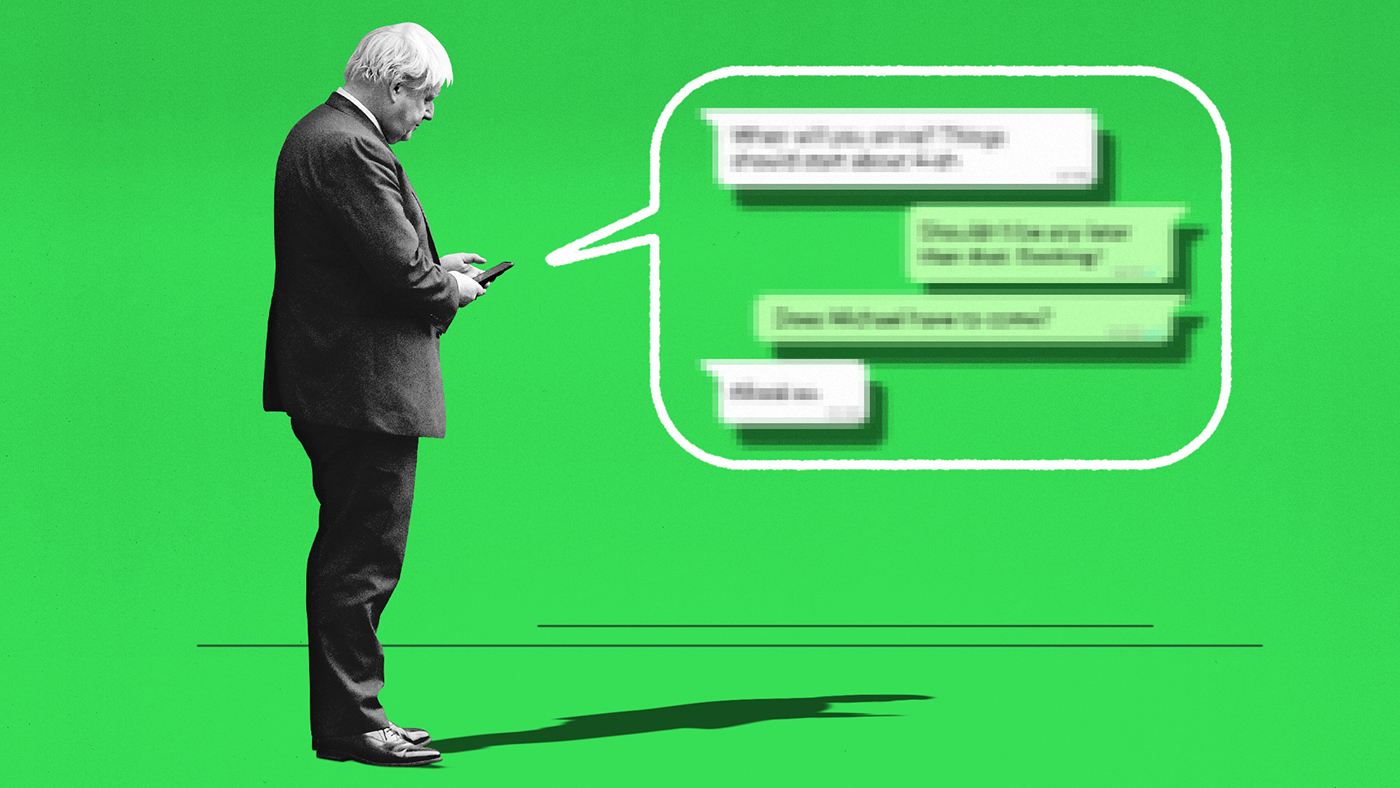Covid inquiry: what’s in Boris Johnson’s WhatsApps?
Former PM set for bitter legal battle after refusing to hand over unredacted pandemic messages and diaries

A free daily email with the biggest news stories of the day – and the best features from TheWeek.com
You are now subscribed
Your newsletter sign-up was successful
Boris Johnson and other senior members of his government are likely to ignore a new legal deadline to hand over unredacted messages sent during the pandemic to the Covid-19 public inquiry.
Last week the inquiry’s chair, Baroness Hallett, threatened legal action against the Cabinet Office unless it handed over diaries and WhatsApp exchanges involving the former prime minister from January 2020 to February 2022 by 4pm today.
Cabinet Office officials asked for an extension to 5 June, saying they do not have access to Johnson’s messages or notebooks, but this request was rejected. Instead they have been given a new deadline of 4pm on Thursday 1 June.
The Week
Escape your echo chamber. Get the facts behind the news, plus analysis from multiple perspectives.

Sign up for The Week's Free Newsletters
From our morning news briefing to a weekly Good News Newsletter, get the best of The Week delivered directly to your inbox.
From our morning news briefing to a weekly Good News Newsletter, get the best of The Week delivered directly to your inbox.
If the government does not abide by the new deadline, Baroness Hallett “has ordered that a statement be sent by a ‘senior civil servant’ confirming the Cabinet Office does not have the requested information, as well as a chronology of the government’s contacts with Johnson about the requests and whether the government has ever had the data”, reported Sky News.
The Cabinet Office has previously insisted that documents and correspondence covering more than two years and from figures such as Rishi Sunak, Liz Truss, Matt Hancock, Dominic Cummings and Simon Case, the cabinet secretary, do not need to be released in full as parts of the discussions are “unambiguously irrelevant” to the inquiry, would represent a “serious intrusion of privacy” and would stop ministers communicating freely in future.
What did the papers say?
Section 21 of the Inquiries Act 2005 gives the chair of a properly constituted public inquiry the power to compel a witness to testify or produce any relevant documents, with failure to comply punishable with a fine or a prison sentence of up to 51 weeks.
However, the Daily Mail’s deputy political editor Harriet Line has quoted officials as saying they do not believe Hallett has the powers to demand the documents when doing so would set a harmful precedent and could identify junior colleagues.
A free daily email with the biggest news stories of the day – and the best features from TheWeek.com
Ministers will decide on Tuesday whether to launch a judicial review to attempt to circumvent Hallett’s demands, meaning the “standoff now appears to be heading for the extraordinary spectacle of a legal battle between the government and the inquiry”, said Sky News.
Iain Duncan Smith, the former Tory leader, is among those urging the Cabinet Office to stick to its decision not to submit the requested information in full. He accused Hallett in The Daily Telegraph of “trying to be Agatha Christie” by turning the inquiry into a “whodunnit” rather than “whatdunnit”.
This view was countered by the former head of the civil service, Lord Kerslake. He told BBC Radio 4’s “Today” programme that there was “some cover-up going on here to save embarrassment of ministers” and that it could set a “helpful precedent” if the inquiry won the right to release the material.
Hallett’s demand for fully unredacted messages touch on “one of the live issues for her inquiry which is whether the Prime Minister and his government were potentially distracted by other matters to adequately deal with the pandemic”, said Byline Times.
Given Johnson’s reputation “for having a loose tongue and clumsy attitude towards the normal parameters of diplomatic discourse”, the “potential political ramifications” are “huge”, said the news site. But the reality is that the inquiry “is significantly more important than the sensitivities of Boris Johnson or the Conservative Party, whilst the principle, in general, may also be profound”.
What next?
A spokesperson for Johnson said he had “no objection to disclosing the material to the inquiry”, adding: “The decision to challenge the inquiry’s position on redactions is for the Cabinet Office.”
Sky News has reported that Rishi Sunak and the former PM “are expected to speak this week, for the first time since last year, about their approach to the Covid inquiry”.
Johnson has already instructed new legal representation “after losing faith in the Cabinet Office”, reported The Times. “The move further deepens the rift between the former prime minister and the government, after the Cabinet Office handed over entries from his official diary to the police over fears he may have taken part in further rule-breaking during the pandemic,” said the paper.
The Times’s political correspondent George Grylls said that Johnson has been urged to release the diaries “to back up his claims that about a dozen events he hosted during the pandemic were lawful. But Johnson claims that publishing the diaries would breach government rules on disclosure and has refused to do so, citing national security grounds.”
Sky News said Johnson was “furious” at the pre-emptive move by the Cabinet Office, while “allies are also accusing Oliver Dowden, Cabinet Office minister, deputy prime minister and Sunak’s closest ally, of sanctioning ‘a political stitch-up’ to smear Johnson and prolong the Privileges Committee inquiry”.
The former PM is among those who will give evidence to the inquiry, which is due to start hearings in two weeks. However, the likelihood of a protracted legal battle “raises the prospect that the inquiry could be delayed even further, having already been delayed while names of civil servants are redacted”, said The Telegraph.
The inquiry has already “been criticised for the length of time it is expected to take”, said the paper, “with documents revealing the Government is planning for it to last up to seven years”. By contrast, “the chair of the inquiry into Covid in Sweden… has already completed his final report”.
-
 How to Get to Heaven from Belfast: a ‘highly entertaining ride’
How to Get to Heaven from Belfast: a ‘highly entertaining ride’The Week Recommends Mystery-comedy from the creator of Derry Girls should be ‘your new binge-watch’
-
 The 8 best TV shows of the 1960s
The 8 best TV shows of the 1960sThe standout shows of this decade take viewers from outer space to the Wild West
-
 Microdramas are booming
Microdramas are boomingUnder the radar Scroll to watch a whole movie
-
 How are Democrats turning DOJ lemons into partisan lemonade?
How are Democrats turning DOJ lemons into partisan lemonade?TODAY’S BIG QUESTION As the Trump administration continues to try — and fail — at indicting its political enemies, Democratic lawmakers have begun seizing the moment for themselves
-
 How did ‘wine moms’ become the face of anti-ICE protests?
How did ‘wine moms’ become the face of anti-ICE protests?Today’s Big Question Women lead the resistance to Trump’s deportations
-
 How are Democrats trying to reform ICE?
How are Democrats trying to reform ICE?Today’s Big Question Democratic leadership has put forth several demands for the agency
-
 Why is Tulsi Gabbard trying to relitigate the 2020 election now?
Why is Tulsi Gabbard trying to relitigate the 2020 election now?Today's Big Question Trump has never conceded his loss that year
-
 Will Democrats impeach Kristi Noem?
Will Democrats impeach Kristi Noem?Today’s Big Question Centrists, lefty activists also debate abolishing ICE
-
 Do oil companies really want to invest in Venezuela?
Do oil companies really want to invest in Venezuela?Today’s Big Question Trump claims control over crude reserves, but challenges loom
-
 What is China doing in Latin America?
What is China doing in Latin America?Today’s Big Question Beijing offers itself as an alternative to US dominance
-
 Why is Trump killing off clean energy?
Why is Trump killing off clean energy?Today's Big Question The president halts offshore wind farm construction